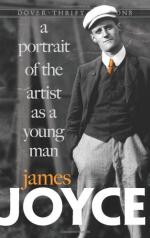—Tell me the truth. Were you at all shocked by what I said?
—Somewhat, Stephen said.
—And why were you shocked, Cranly pressed on in the same tone, if you feel sure that our religion is false and that Jesus was not the son of God?
—I am not at all sure of it, Stephen said.
He is more like a son of
God than a son of Mary.
—And is that why you will not communicate, Cranly asked, because you are not sure of that too, because you feel that the host, too, may be the body and blood of the son of God and not a wafer of bread? And because you fear that it may be?
—Yes, Stephen said quietly, I feel that and I also fear it.
—I see, Cranly said.
Stephen, struck by his tone of closure, reopened the discussion at once by saying:
—I fear many things: dogs, horses,
fire-arms, the sea,
thunder-storms, machinery, the country roads at night.
—But why do you fear a bit of bread?
—I imagine, Stephen said, that there is a malevolent reality behind those things I say I fear.
—Do you fear then, Cranly asked, that the God of the Roman catholics would strike you dead and damn you if you made a sacrilegious communion?
—The God of the Roman catholics could do that now, Stephen said. I fear more than that the chemical action which would be set up in my soul by a false homage to a symbol behind which are massed twenty centuries of authority and veneration.
—Would you, Cranly asked, in extreme danger, commit that particular sacrilege? For instance, if you lived in the penal days?
—I cannot answer for the past, Stephen replied. Possibly not.
—Then, said Cranly, you do not intend to become a protestant?
—I said that I had lost the faith, Stephen answered, but not that I had lost self-respect. What kind of liberation would that be to forsake an absurdity which is logical and coherent and to embrace one which is illogical and incoherent?
They had walked on towards the township of Pembroke and now, as they went on slowly along the avenues, the trees and the scattered lights in the villas soothed their minds. The air of wealth and repose diffused about them seemed to comfort their neediness. Behind a hedge of laurel a light glimmered in the window of a kitchen and the voice of a servant was heard singing as she sharpened knives. She sang, in short broken bars:
Rosie O’Grady.
Cranly stopped to listen, saying:
—MULIER CANTAT.
The soft beauty of the Latin word touched with an enchanting touch the dark of the evening, with a touch fainter and more persuading than the touch of music or of a woman’s hand. The strife of their minds was quelled. The figure of a woman as she appears in the liturgy of the church passed silently through the darkness: a white-robed figure, small and slender as a boy, and with a falling girdle. Her voice, frail and high as a boy’s, was heard intoning from a distant choir the first words of a woman which pierce the gloom and clamour of the first chanting of the passion:




